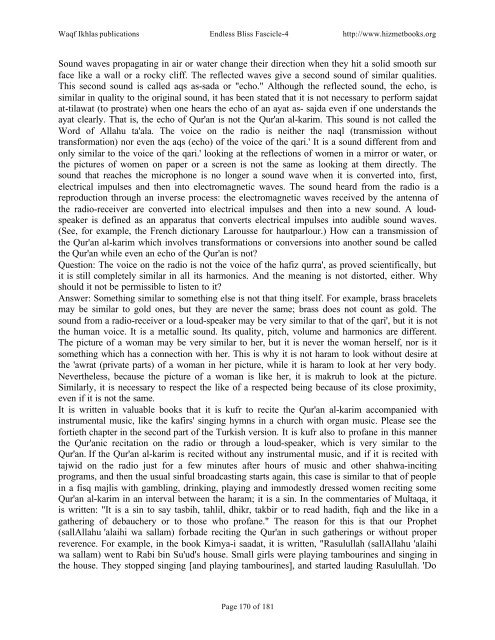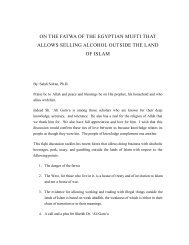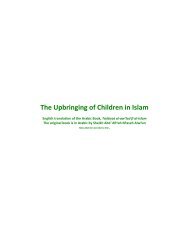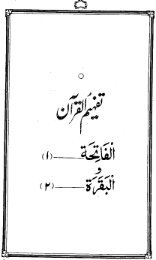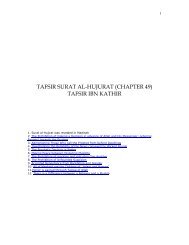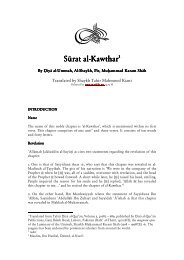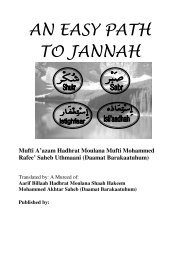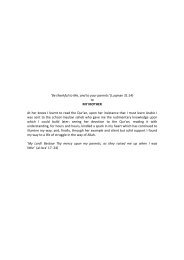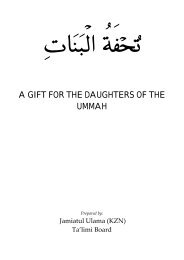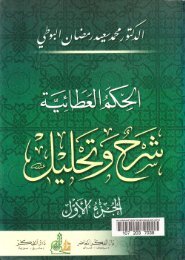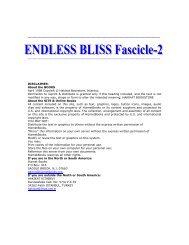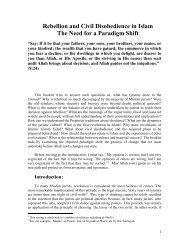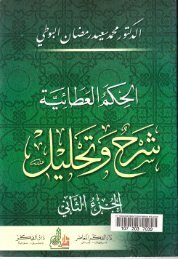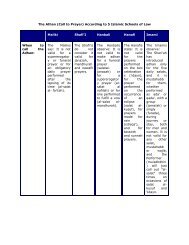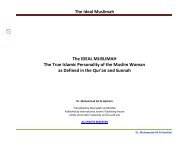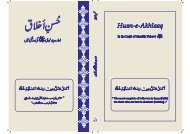ENDLESS BLISS FASCICLE-4
ENDLESS BLISS FASCICLE-4
ENDLESS BLISS FASCICLE-4
Create successful ePaper yourself
Turn your PDF publications into a flip-book with our unique Google optimized e-Paper software.
Waqf Ikhlas publications Endless Bliss Fascicle-4 http://www.hizmetbooks.org<br />
Sound waves propagating in air or water change their direction when they hit a solid smooth sur<br />
face like a wall or a rocky cliff. The reflected waves give a second sound of similar qualities.<br />
This second sound is called aqs as-sada or "echo." Although the reflected sound, the echo, is<br />
similar in quality to the original sound, it has been stated that it is not necessary to perform sajdat<br />
at-tilawat (to prostrate) when one hears the echo of an ayat as- sajda even if one understands the<br />
ayat clearly. That is, the echo of Qur'an is not the Qur'an al-karim. This sound is not called the<br />
Word of Allahu ta'ala. The voice on the radio is neither the naql (transmission without<br />
transformation) nor even the aqs (echo) of the voice of the qari.' It is a sound different from and<br />
only similar to the voice of the qari.' looking at the reflections of women in a mirror or water, or<br />
the pictures of women on paper or a screen is not the same as looking at them directly. The<br />
sound that reaches the microphone is no longer a sound wave when it is converted into, first,<br />
electrical impulses and then into electromagnetic waves. The sound heard from the radio is a<br />
reproduction through an inverse process: the electromagnetic waves received by the antenna of<br />
the radio-receiver are converted into electrical impulses and then into a new sound. A loudspeaker<br />
is defined as an apparatus that converts electrical impulses into audible sound waves.<br />
(See, for example, the French dictionary Larousse for hautparlour.) How can a transmission of<br />
the Qur'an al-karim which involves transformations or conversions into another sound be called<br />
the Qur'an while even an echo of the Qur'an is not?<br />
Question: The voice on the radio is not the voice of the hafiz qurra', as proved scientifically, but<br />
it is still completely similar in all its harmonics. And the meaning is not distorted, either. Why<br />
should it not be permissible to listen to it?<br />
Answer: Something similar to something else is not that thing itself. For example, brass bracelets<br />
may be similar to gold ones, but they are never the same; brass does not count as gold. The<br />
sound from a radio-receiver or a loud-speaker may be very similar to that of the qari', but it is not<br />
the human voice. It is a metallic sound. Its quality, pitch, volume and harmonics are different.<br />
The picture of a woman may be very similar to her, but it is never the woman herself, nor is it<br />
something which has a connection with her. This is why it is not haram to look without desire at<br />
the 'awrat (private parts) of a woman in her picture, while it is haram to look at her very body.<br />
Nevertheless, because the picture of a woman is like her, it is makruh to look at the picture.<br />
Similarly, it is necessary to respect the like of a respected being because of its close proximity,<br />
even if it is not the same.<br />
It is written in valuable books that it is kufr to recite the Qur'an al-karim accompanied with<br />
instrumental music, like the kafirs' singing hymns in a church with organ music. Please see the<br />
fortieth chapter in the second part of the Turkish version. It is kufr also to profane in this manner<br />
the Qur'anic recitation on the radio or through a loud-speaker, which is very similar to the<br />
Qur'an. If the Qur'an al-karim is recited without any instrumental music, and if it is recited with<br />
tajwid on the radio just for a few minutes after hours of music and other shahwa-inciting<br />
programs, and then the usual sinful broadcasting starts again, this case is similar to that of people<br />
in a fisq majlis with gambling, drinking, playing and immodestly dressed women reciting some<br />
Qur'an al-karim in an interval between the haram; it is a sin. In the commentaries of Multaqa, it<br />
is written: "It is a sin to say tasbih, tahlil, dhikr, takbir or to read hadith, fiqh and the like in a<br />
gathering of debauchery or to those who profane." The reason for this is that our Prophet<br />
(sallAllahu 'alaihi wa sallam) forbade reciting the Qur'an in such gatherings or without proper<br />
reverence. For example, in the book Kimya-i saadat, it is written, "Rasulullah (sallAllahu 'alaihi<br />
wa sallam) went to Rabi bin Su'ud's house. Small girls were playing tambourines and singing in<br />
the house. They stopped singing [and playing tambourines], and started lauding Rasulullah. 'Do<br />
Page 170 of 181


